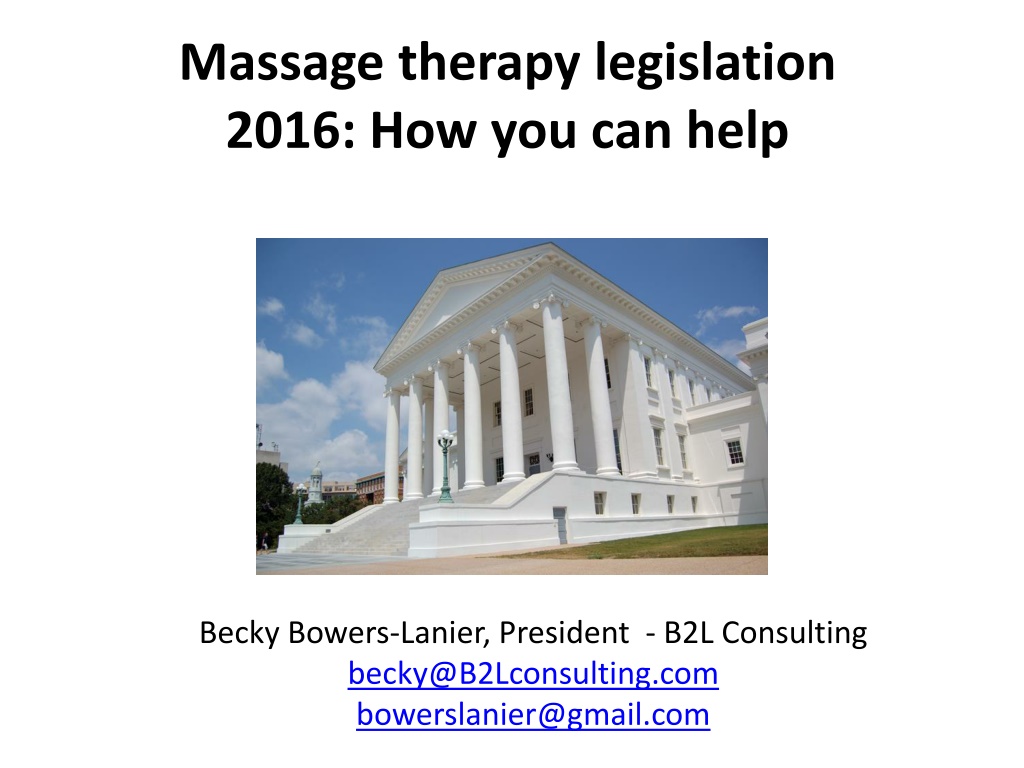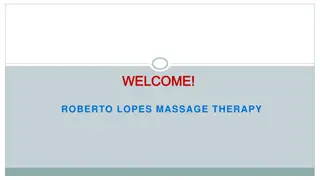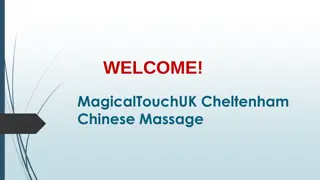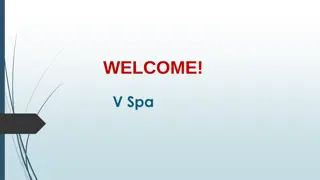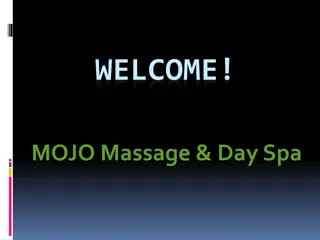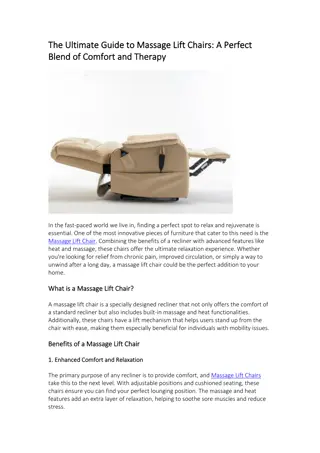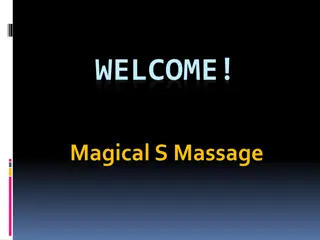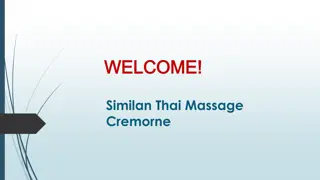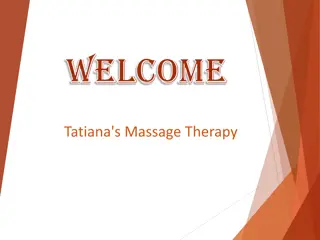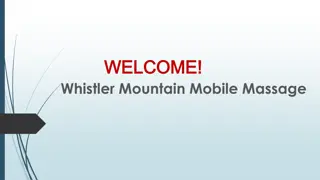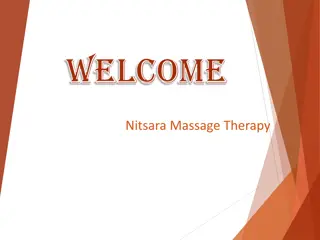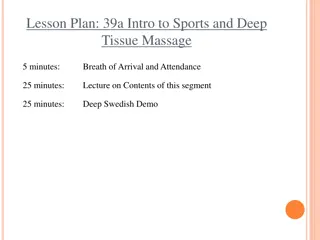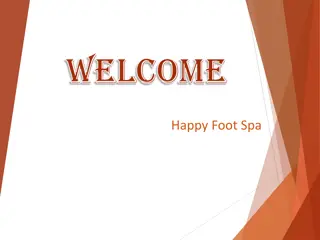Understanding the 2016 Massage Therapy Legislation Changes in Virginia
Explore the key points of the massage therapy bill enacted in 2016 by Becky Bowers-Lanier. The legislation aims to transition regulation from state certification to licensure for massage therapists in Virginia, enhancing public safety and professional standards. Discover the significance of licensure for practitioners and the benefits it offers both professionals and the public.
Download Presentation

Please find below an Image/Link to download the presentation.
The content on the website is provided AS IS for your information and personal use only. It may not be sold, licensed, or shared on other websites without obtaining consent from the author. Download presentation by click this link. If you encounter any issues during the download, it is possible that the publisher has removed the file from their server.
E N D
Presentation Transcript
Massage therapy legislation 2016: How you can help Becky Bowers-Lanier, President - B2L Consulting becky@B2Lconsulting.com bowerslanier@gmail.com
What well discuss: What the massage therapy bill aims to do A review of Civics 101 or what you should ve learned in high school if you were paying attention The political landscape What you need to do to get our bill passed
The massage therapy bill (right now) Changes the Code of Virginia on the regulation of massage therapists from state certification to licensure Makes small changes to the definition of MT Adds a section about who is exempt from licensure Makes technical changes in the law to change certification to licensure Adds applicants for licensure to the list of individuals who must submit to fingerprints and national criminal background checks Removes outdated language Enactment date postponed to 2017
Important points to be made Licensure is the most appropriate type of regulation for MT: MTs practice autonomously and in one-on-one settings with clients. MT practice has the potential to harm the public from negligence, incompetence, or unethical behavior.
Additional important points In some jurisdictions people are practicing MT under loophole in current law. May be associated with: Human trafficking. Prostitution. Some jurisdictions have on their own required all who practice MT to be certified (exceeding state law).
How will licensure benefit me? Protects my practice because it makes it illegal for unlicensed people to practice massage therapy. Having a license may help make your case for insurance reimbursement. Puts me in the same place with other licensees of the Dept of Health Professions like nurses, physicians, pharmacists, acupuncturists, physical and occupational therapists, and the like.
How will licensure help the public? The public should be assured that when they receive services from a massage therapist, that person has met the requirements for licensure in Virginia. The public has assurances that they can complain to the Dept of Health Professions if they believe they were harmed by a massage therapist. It may be more difficult for individuals to participate in human trafficking under the guise of massage therapy.
What are the nuts and bolts of the proposed licensure bill? (see slide 2 or look below) Changes the Code of Virginia on the regulation of massage therapists from state certification to licensure Makes small changes to the definition of MT Adds a section about who is exempt from licensure Makes technical changes in the law to change certification to licensure Adds applicants for licensure to the list of individuals who must submit to fingerprints and national criminal background checks Removes outdated language Enactment date postponed to 2017
Current and proposed definition of massage therapy "Massage therapy" means the treatment of soft tissues for therapeutic purposes by the application of massage and bodywork techniques based on the manipulation or application of pressure to the muscular structure or soft tissues of the human body. The terms "massage therapy" and "therapeutic massage" do not include the diagnosis or treatment of illness or disease or any service or procedure for which a license to practice medicine, nursing, chiropractic therapy, physical therapy, occupational therapy, acupuncture, or podiatry is required by law. "Massage therapy meansthe treatment of soft tissues for therapeutic purposes by the application of massage and bodywork techniques based on the manipulation or application of pressure to the muscular structure or soft tissues of the human body. The terms term "massage therapy" "therapeutic massage do does not include the diagnosis or treatment of illness or disease or any service or procedure for which a license to practice medicine, nursing, midwifery, chiropractic, physical therapy, occupational therapy, acupuncture,athletic training, or podiatry, is required by law.
Other proposed changes in the MT law Exemptions from the licensure requirement Students under supervision of licensed MT LMTs from other states in Virginia for athletic events Family members Other Virginia regulated health professions for whom massage may be part of their practice
Criminal background checks Requirement for RN and LPN applicant licensure effective 2017. Consistent with our position that some people practicing uncertified are victims of human trafficking or are practicing prostitution. This will serve as a deterrent. May assist MTs to argue for changes in local ordinances that require criminal background checks Does NOT apply to those MTs holding current state certification, only to applicants for licensure
Why the delayed enactment of the law? The law will become effective in 2017 instead of 2016. The delay will enable the Board of Nursing to institute the criminal background checks for all nurse and MT applicants at the same time. The delay will give an extra year to MTs who are not currently certified to become so.
How will the law affect me? There will be no practical effect other than to say that you ll be licensed instead of state- certified. Also: No increase in fees No additional regulatory requirements No need to apply for your license. At renewal, you will be issued a license; not a certificate. No need to get a criminal background check.
Now that you know the bills intents, what is next? What you need to know to be a savvy advocate. Basically: Who are your state delegate and state senator How do I get a hold of them? What do I say? How do I follow up? Why is this important?
And one more important thing For those of you who can come to the General Assembly during the legislative session: Plan on coming to our legislative day where we do seated massages. 5 East conference room February 3, 9:30-11:30 If you are available, plan to come to the committee meetings when our bill is deliberated. No times available, but if you think you want to participate, let me know.
Review on three branches of government Legislative General Assembly Congress City Council Executive Governor President Mayor Judicial Courts Commonwealth attorneys
The Virginia General Assembly: tidbits Citizen legislature House of Delegates 100 members 2-year terms Elected every odd year Senate: 40 members Elected every four years in odd years
The Virginia General Assembly Calendar Each even year 60-day session New members (every other year, HOD, every four years, Senate) Budget adopted Each odd year 45-day session No new members (unless special election) Budget amended
Bills: From idea into reality Constituents express need for a change in law Need expressed to legislator or member of executive branch Need put into legislative language Bill assigned to committee Committee acts on bill Amendments
From idea into reality (continued) House acts Passed bill crosses over to other house Process repeated Bill passes Same bill must pass in both houses Passed bill on to the Governor Governor signs into law effective (usually) July 1st Bills may be carried over in the first year of the biennium (even year)
Our licensure bill Will be introduced in the House only. Our patron is Delegate Roxann Robinson. It will be assigned to the House Health, Welfare, and Institutions Committee. When it goes to the Senate (if it passes out of the House), it will be assigned to the Senate Education and Health Committee
Find patron and draft language Refer to committee Idea To house or senate First reading Second reading Third reading To opposite house Third reading First reading Second reading To Governor
Successful advocacy entails Many individuals and groups saying the same message In every venue From every perspective Using every event and opportunity to deliver the message Without unduly annoying legislators! 23
How is advocacy best achieved in a Frenetic fast- paced legislative session? Work done up front. December. Develop the issue way ahead of time and bring in stakeholders early to comment and suggest changes Messy process but invaluable Expect and appreciate divergence of perspectives, especially from those with a lot of skin in the game Talk with possible patrons early Majority party Interest in the topic Know how they work their bills
What advocacy consultants (like me) see as success in meeting with your legislator Getting to know them before you need them. Being polite. Get to know the legislative aide. Learning the issue you are advocating for. Telling a good story and backing the story up with facts Respecting others views. No trash talking. Being mindful of the time. Staying focused. Using a one-pager. Asking for their support and listening for their answer.
Who will be opposed to our bill? Some conservatives who believe that there are too many state regulations. Some people who are practicing massage now and who do not want to be licensed. Our position: Massage therapy has the potential to harm the public if it is not done properly. Therefore, licensure is the most effective form of regulation. MTs almost always practice one-on-one with their clients out of the public view. Clients needs this form of protection. The enactment date will allow people time to get licensed without a penalty.
Who is an effective advocate? Gets to know him/her before she needs them Believes in and can speak and interpret the message Knows her delegate and senator Gets a call back in 30 minutes or less Interacts even if differs politically and ideologically Responds within 24 hours to each request for advocacy Reports back to the person making the request Works on campaigns (time, talent, and/or $$)
Engaging the Grassroots lobbying Effort Influencing members to support (or oppose) a bill by constituents Methods In person By snail mail By email or fax By phone
Who are lobbyists? Many with law or legal expertise. From all walks of life. Full-time, employed lobbyists (think Dominion, Verizon) may be experienced with subject matter. Contract lobbyists (think someone like BBL) must be quick learners.
Attributes of good lobbyists Know people. the relevant legislators and their aides Teach people Help others learn and become excellent grassroots lobbyists Communicate with people Excellent interpersonal skills (speaking and listening, interpreting nonverbal), learning what makes others tick
More on lobbyist attributes Adept at the art of persuasion Able to work backroom deals Maintain relationships with other lobbyists whose clients may be on the same or opposite sides of their clients Honesty (hard to believe) Able to spin the story Systems thinkers Sense of humor
The political landscape We have an ideologically split government House will have a strong Republican majority Senate: 19 Ds and 21 Rs The statewide officials are all Democrats and will remain so until January 2018
An individual has not started living until he can rise above the narrow confines of his individualistic concerns to the broader concerns of all humanity. Martin Luther King, Jr.
